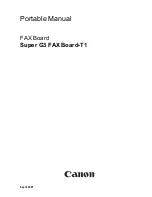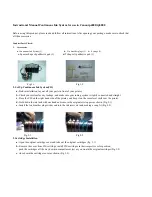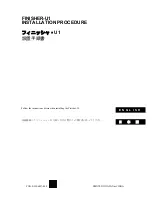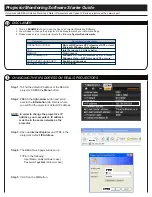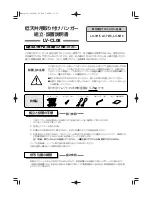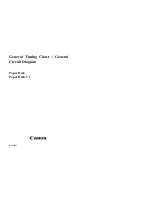
truss head screw through one of the four holes In the lintel clamp and into the
lintel clamp angle and tighten-use whichever of the four holes as necessary,
depending on the width ol your fireplace's lintel bar.
c) Place the lintel clamp and angle on top of a bracket, as shown. Fasten to
gether
with a
¼-20 x
½
flat head carriage bolt, inserted
through the
square
hole in the lintel clamp and through the bracket as shown, and a ¼-20 nut
do not tighten more than finger-light at this time.
d) Repeat steps b) through c) for the second lintel clamp assembly.
e) Bracket is flexible and can easily be formed to suit the installation.
1/4 • 20 Nut
I
FIG. C
4
Fig C:
Attach
the two complete lintel clamp assemblies (from step 3)
to the upper mounting stud with the 1/4-20 nut. Do not tighten at this
point. Bracket can be bent down or up to fit Individual mounting situation
to clear fireplace lintel.
FIG. 0
5
Fig. D:
Attach the two remaining brackets to the firescreen at the bottom,
on
each side, with ¼-20 nut onto the stud in the firescreen frame, as shown.
/
Flrescreen
FIG. E
"'
Metal lintel
bar
Lintel clamp
assembly
screw
&
Fig. E:
Attach
the firescreen to the fireplace as
follows:
a) Fit the firescreen to the fireplace opening with the lintel clamp assemblies
and brackets inside the fireplace (these may have to be adjusted In order to
clear the fireplace opening). Bend bracket to fit.
b) Position the two upper lintel clamps and tighten the thumb screws to
securely grip the metal lintel bar inside your fireplace as shown. Ensure that
the firescreen is flush against the face of the fireplace and tighten all upper
screws and nuts.
FIG. F
Fig. F:
The bottom of the firescreen should rest on the hearth outside the
7
fireplace. If the hearth does not extend out far enough to support the bottom
of the firescreen you will need to secure the bottom of the firescreen. This is
done by attaching the lower brackets to the floor (shown) or sides of the fire
place-follow the instructions below. Otherwise, adjust the lower brackets as
needed until they rest on the floor of the fireplace and leave unattached.
8
Fig. F:
Secure the bottom of the firescreen as follows: .
a) Drill two holes, using a 1/t1' masonry drill, about 2' deep into the floor or
sides of the fireplace-determine suitable locations for each hole by using
the two lower brackets (from step 5), attached to the firescreen (one hole re
quired per bracket). Mark the hole locations and move the brackets out of the
way before drilling the holes.
b) Next, gently tap a 10-14 x 1 lead anchor Into each of the two holes you
have drilled (one anchor in each hole) using a hammer.
c) Move the brackets back into position over the holes and insert a #14 x 1-¼
screw into each hole to secure the brackets.
d) Make certain sides of firescreen are parallel and that the frame is not
slightly twisted when mounted. If sides are not parallel, doors will not align
properly when closed. If either door pulls away from the top or bottom of the
frame and does not line up with the other door, adjust frame by loosening
bottom mounts and slightly pulling out on frame at the bottom left or bottom
right until doors line up with each other and the frame. Retighten bottom
mounts.
NOTE: For fireplaces other than standard conligurationi or constructloni,
consult your dealer for information concerning alternative mounting methods.
g
Some of the fiberglass
may
have squeezed out from behind the firescreen
during installation. Use a thin object, such as a letter opener or knife. to care
fully push the fiberglass back behind the firescreen for a neat appearance. Be
careful not to scratch or damage the finish on your firescreen.
Damper Operation.
Your firescreen is equipped with lower hidden damper operator located at the
bottom center of the firescreen, behind the door. The damper can be opened
or closed by moving the damper operator
-
right
to
open
or
left
to
close
.
With your Portland Willamette firescreen In place, you need not close your fire
place's flue damper as you can simply close the damper on the flrescreen,
effectively sealing off the fireplace from the rest of your home. This is not only
more convenient, but allows you to let a fire burn out without letting the heat in
your home escape up the chimney. Using your firescreen's damper, in conjunction
with your flue damper, you can usually achieve optimum burning and draft condi
tions for your fireplace to maximize burning efficiency and heat output while reduc
ing or eliminating any smoking problems. Experiment with different flue and
firescreen damper settings until you find the combination which works best with
your fireplace.
6.2019



